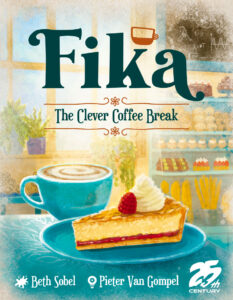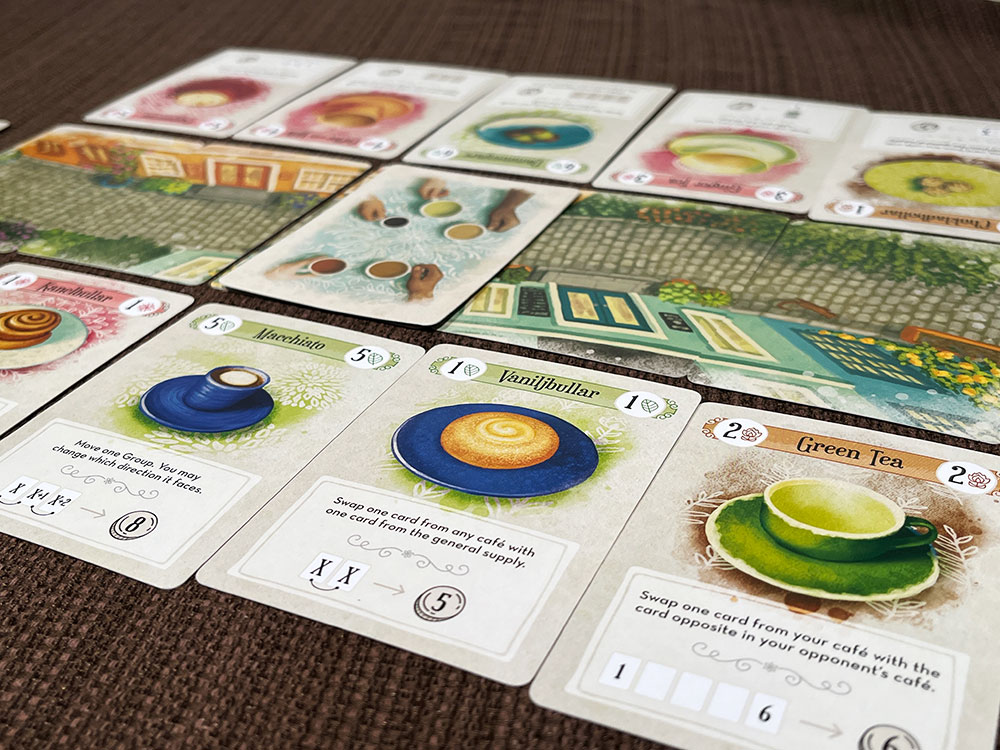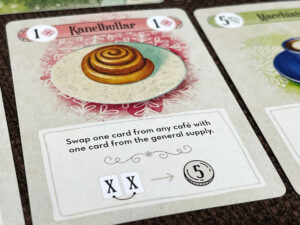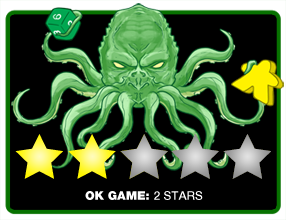 Fika is a Swedish term that is often translated as “a coffee and cake break”. According to my googling about it, it’s an important part of Swedish culture. A time to stop and socialize… to pause your day. It’s as important to the Swedes as the Belgium techno anthem “Pump Up The Jam” is to musical history.
Fika is a Swedish term that is often translated as “a coffee and cake break”. According to my googling about it, it’s an important part of Swedish culture. A time to stop and socialize… to pause your day. It’s as important to the Swedes as the Belgium techno anthem “Pump Up The Jam” is to musical history.
Today, we are going to look at a new card game for two players called Fika. You and your opponent are operating rival coffee houses trying to attract the most customers… I think. If this is truly what Fika is about, it’s actually kind of mean. But more on that later.
Gameplay Overview:
Fika is played out in a best-two-out-of-three series. In each round, players are dealt a hand of 6 cards. Every card has a suit (one of 3), a number (from 1-6), a special power you can activate when played, and a way it scores you points.
Each turn, players select one card from their hand and place it face down to be revealed simultaneously. The player with the higher number gets to place their card first. Cards are played into one of your 5 coffee shop locations. The special powers they grant will let you move cards around, swap cards from the market, or move groups that increase scoring.
After 5 cards have been played by both players, the round ends, and scoring cards are evaluated. Each card has its own scoring condition, and they range from having sequential cards in your shop, to cards with the same suit, to being near the coffee drinker group. Whoever has the most points wins the round. Win two rounds and you win the game.

Game Experience:
The first thing you will notice about Fika is the amazing art by the talented Beth Sobel. Her serene illustrations definitely take you into the mood of what Fika is supposed to be. That cup of mocha or slice of kladdkaka just begs you to slow down, relax and savor the moment.

However, once that moment of zen has passed, be prepared for some ruthless competition. In Fika, there are no friends. Many of the card’s special powers let you not only swap or arrange cards in your coffee shop, but in your opponents as well. So even your perfectly played hand can get dumped to zero points at the last minute by a single card play from your opponent.
And that’s the rub with Fika. It’s just too random and vicious of a game for me. The deck is only 18 cards, however, if you don’t get a hand of cards that work well together, you are going to be behind the proverbial 8 ball. If most of your scoring cards ask you to have 3 or 4 cards of the same suit, and you just don’t have that, there aren’t a ton of options to fix that. Sure there are cards that let you swap with your opponent or the supply, but you need to not only have those cards to perform the action, but also need the cards to target.

And to be honest, I could deal with the randomness, as Fika is a fairly quick game, if it wasn’t for the nasty bit of player interaction. While that doesn’t sound too bad, half of the powers let you affect your opponent’s cafe. It can be incredibly frustrating for you to spend 5 rounds carefully laying out your cards for maximum value, only for your opponent to casually play a single card that undoes all your hard work. It really takes away the player agency. In one game I went from a potential score of 20+ points to zero in the last round because my opponent swapped my cards around.
Which is too bad, because buried under all these special powers is a thinky and fun game. Yet Fika is just super swingy. Even when it comes to scoring. Most cards score 6 to 9 points. But the group card can double or even triple the value of a card. This means if your opponent happens to get the group in front of even one of their scoring cards, that single score could beat your entire side. For me, it’s just way too much randomness in a card game that’s trying to be strategic.
Final Thoughts:
Fika had a lot of potential, and the Beth Sobel art is sure to catch people’s eye. However the game just leans too far into the luck side of the equation, where the person that draws the stronger hand is probably going to win the round. If I’m looking for a two-player game in this vein, I’d probably just head over to Jaipur, a classic game that still holds up today. Which is too bad, because I was liking the puzzly aspects of the game until things just started to unravel.
Final Score: 2 stars – A thinky card game with great art that’s bogged down by its randomness.
 Hits:
Hits:
• Beautiful Art
• Quick playing
Misses:
• Too much randomness
• Too easy for your cards to be messed with
• Gameplay doesn’t seem to fit the theme





















